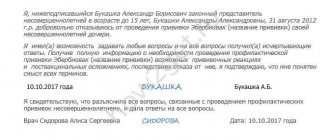The annual flu vaccination campaign will start in September 2021. In this article, we will answer the main questions related to the seasonal epidemic of respiratory diseases and talk about the vaccines that are available to children and their parents this season.
Available: Ultrix quadri, Grippol Plus, Sovigripp and Flu-M.
Contraindications
Contraindications can be temporary or absolute. The following are subject to an absolute ban on influenza vaccination:
- People allergic to egg whites (many influenza vaccines use chicken embryos). In Russia, all available vaccines contain chicken protein. However, this allergy will not be a problem in countries where there are vaccines created without the participation of such proteins.
- People with severe reactions and post-vaccination complications after receiving previous doses of the vaccine. This is a fairly rare occurrence, however, if there are negative reactions to the first dose of the vaccine, this drug is not recommended for further use.
Temporary contraindications include cases of exacerbation of any chronic disease or infection. For example, with acute respiratory viral infections and intestinal diseases, you need to wait until the temperature drops; for seasonal allergies - when it goes into remission; for hypertension - stabilize blood pressure. After this, the “green light” is turned on for vaccination: you can and should go to the clinic for an annual vaccination.
Figure 1. Usually, the current dates of use are written on the vaccine package.
Coronavirus infection is not a contraindication to vaccination. As with any other infection, you need to wait for recovery.
For more information about contraindications and the compatibility of flu vaccination with coronavirus, read the articles “Flu Vaccination: Contraindications” and “What you need to know about flu vaccination in the era of COVID-19.”
We also recommend that you familiarize yourself with the episode of the program “Science Against”, with a physician of the highest category, toxicologist, popularizer of science Alexey Vodovozov.
I don’t want to get vaccinated against COVID-19, but I trust the flu vaccine. Will it also save you from coronavirus?
As the WHO notes, vaccination trains the immune system to fight a specific disease; we are not talking about resisting any infections. And yet, despite the insufficient study of the coronavirus, there are studies that claim that the flu vaccine partially reduces the likelihood of contracting Covid or mitigates the course of the infection. One of these articles, which took into account data on older people, was published by Taiwanese scientists in May 2021.
“The vaccine is narrowly targeted and protects only against the disease it is intended to protect against. Nevertheless, it stimulates the so-called post-vaccination process in the body and activates the immune system as a whole. Any vaccine also increases nonspecific immunity. That is, after getting a flu shot, the body will be able to repel the attack of the coronavirus, even with a minor infection. However, this effect does not last long, usually a couple of weeks, notes Vladimir Bolibok. — By the way, some influenza vaccines contain immunomodulators, which make the post-vaccination process longer, and then protection increases to 1.5-2 months. So the point is not that the vaccine saves from one infection and from another, but that in general a nonspecific immune response is activated.”
17405
If Covid didn’t finish you off, will its trace finish you off?
Ultravac
Ultravac is a live influenza vaccine. It contains live attenuated influenza A viruses (H1N1 and H3N2) and influenza B viruses, which are obtained from the virus-containing fluid of chicken embryos.
It is administered once as an instillation into the nose for children aged 3 years and older. The injection is made using a syringe with a special spray nozzle attached to it instead of a needle. Inject 0.25 ml of vaccine into each nostril.
The immune response to its administration is stronger than with other vaccines. And the immune system is more stable.
Contraindications
For this vaccine, additional contraindications are added to the general ones.
The vaccine is not administered to children under 3 years of age.
The vaccine is live, therefore it is not administered to children with immunodeficiencies, malignant neoplasms, receiving immunosuppressants, pregnant or lactating women.
Because the vaccine is administered intranasally, a runny nose is a contraindication.
Side effects
After vaccination, the temperature may rise to 37.5 and runny nose. Which resolve spontaneously, without treatment, within 3 days.
For 2 days after vaccination, it is not recommended to use any other medications in the form of drops or nasal sprays.
At-risk groups
- Children with chronic lung diseases, including bronchial asthma and chronic bronchitis;
- Children with heart disease, including children with hemodynamic disorders receiving immunosuppressive treatment, with anemia and other hemopathy;
- Children with diabetes, chronic kidney disease, metabolic diseases; children with immunodeficiencies, including HIV-infected children;
- Children who received aspirin/analogs for a long time due to the risk of developing Reye's syndrome due to influenza.
- Adults caring for these children, hospital/child care staff, relatives.
Flu vaccinations are included in the Russian National Vaccination Calendar of Russia in accordance with Order No. 51 of the Ministry of Health of the Russian Federation dated January 31, 2011, as a vaccination for epidemic indicators.
When does vaccination usually start and end?
All doctors talk about the importance of regular flu vaccinations.
But when vaccinations are given, what is the best time to start? The influenza virus attacks in the fall, so the vaccine should be given at the end of summer - 3-4 weeks before the cold season, when weakened immunity is most vulnerable. The vaccine can be administered even in the spring, since from year to year spring becomes the leader in the incidence of influenza. The effect of the vaccination will last about a year. And next year you will need to get vaccinated again: after all, the virus is mutating and the immune system is no longer able to cope with it. We talk in more detail about the virus and protection against it in this article. In Russia, the flu vaccination season usually begins in early September. Sometimes mass vaccination starts earlier or later than this period, which is due to the complexity of the vaccine production chain. Before the drug hits the market, work is done in several directions at once: they study the incidence of influenza in the world, determine mutations in the genes of the virus, grow the virus and after that create a vaccine.
Virologists examine the blood of people who have had the flu, determine its type and strain (a unique number with information about the type, place of origin, animal carrier and year of occurrence). Epidemiologists exchange experience twice a year at scientific conferences and decide which flu strains will be most active in the coming season. They transfer this data to pharmaceutical companies that begin production of the vaccine. If scientists need more time to identify dangerous and active strains in the current season, the release of the current vaccine is delayed.
Important! Flu is a virus that spreads very quickly. Its structure includes surface proteins: hemagglutinins and neuraminidases. These proteins make up different combinations, which, moreover, are subject to mutations, as a result of which a new strain is formed every time two different viruses meet. This is why the work of virologists and epidemiologists is so important, and for the same reason it is necessary to get a flu shot every year.
In Russia, Roszdravnadzor announces the start of vaccination. Doctors advise not to wait for cold weather and the peak of colds and to get vaccinated against seasonal flu as soon as the vaccine becomes available. Therefore, sometimes the start occurs in August. But usually the optimal period for immunization is considered to be September - October, 3-4 weeks before the start of the seasonal epidemic.
The vaccination season never ends; doctors recommend vaccination both in winter and spring. This is due to the fact that in recent years, in the country and the world, the peak incidence occurred in February and even March. Therefore, if you get vaccinated later - in January-February, you can protect yourself from a flu outbreak in early spring.
Unlike vaccination season, the vaccines themselves may run out. Doctors warn: starting from January, it will be more difficult to find a vaccine in public clinics than at the start of vaccination. However, a paid clinic will most likely always have a vaccine, at any time of the year. With late vaccination, it is important to clarify the duration of the drug; as a rule, it ranges from six months to 1 year. If a vaccine only lasts six months and was developed in September, it will no longer be effective in March.
Is it possible to get vaccinated in the summer?
Source: McKinsey/Rawpixel
Vaccination in the summer, according to doctors, does not make sense. On the one hand, vaccines with a short duration will not be able to protect against possible peaks in incidence in the spring. On the other hand, it takes 5-6 months to create a vaccine and release it on the market, since pharmaceutical companies receive information about the vaccine strain from epidemiologists and only after that begin production of the vaccine. In a shorter period of time, it is impossible to grow a strain of the virus in laboratories, carry out quality control of the vaccine and conduct clinical trials.
Is it possible to get vaccinated in winter?
Yes. In the absence of the opportunity to get vaccinated earlier, doctors only welcome late immunization - in winter or even spring. It is especially important to get vaccinated for those planning a trip to the Southern Hemisphere. In these countries, the influenza virus is most active during other months, from April to September. And vaccination, even if late, is especially important for those who are most vulnerable. At risk: pregnant women, people with chronic diseases (heart and lung, asthma, diabetes), cancer patients, HIV-infected people. The vaccine gives a person lifelong immunity from the strains of the virus it contains. Therefore, the principle “better late than never” applies here.
Is there a difference in the timing of vaccinations for children, adults and the elderly?
The vaccination season begins at the same time for everyone - children, adults, and the elderly. The only difference is the choice of vaccine and its dose. Children aged 6 months to 2 years (and up to 9 years if they are receiving the vaccine for the first time) are given half the dose of influenza vaccine. The second dose is recommended after 4 weeks, as it increases the effectiveness of immunization.
Some vaccines have age restrictions. Thus, the quadrivalent vaccine, which is already available to Russians, is prohibited for use in children under 6 years of age. There are also vaccines whose instructions specify a maximum age - usually 60 years. An older person will need to choose a different vaccine.
Which vaccine should I choose? Doctors advise choosing a vaccine that contains 15 micrograms of antigens from each strain of the virus. The most effective is the quadrivalent vaccine, which protects against 2 type A viruses and 2 type B viruses. For more information about the types of influenza vaccines, as well as what they consist of and what strains they include, read the articles “Flu vaccinations in 2020- 2021” and “Flu Vaccinations”.
Contraindications to vaccination
- Allergy to chicken proteins, aminoglycoside antibiotics or other components of vaccines, allergy to previous influenza vaccinations;
- Acute diseases/exacerbations of chronic diseases;
- Mild forms of ARVI/OCI - do it immediately after the temperature has stabilized.
Photo: pixabay.com
How do I know if I need a flu vaccine?
Due to the coronavirus pandemic, priorities have shifted somewhat. The World Health Organization (WHO) recommends that doctors be vaccinated first because they take risks every day, and older people because of the large number of chronic diseases. Traditionally, experts call for vaccination of young children, pregnant women and those with health problems. Without artificial immunity, the chance of contracting the flu increases, and it is fraught with serious complications specifically for these groups of the population.
53488 Side effects from vaccination: what are the risks and what should you be wary of?
Epidemics of the disease that occur in autumn and winter can affect up to 20% of citizens, and the annual mortality rate reaches 650 thousand cases in the world. Vaccination allows you to avoid serious consequences, so even if you are not at risk, this is not a reason to refuse artificial immunity, according to the WHO.
How will we vaccinate against the flu in the 2018-19 season?
There will be virtually no imported vaccines in 2021. The Influvac vaccine is not supplied to Russia this year - production in the Netherlands is fully loaded, and it is too late to quickly provide additional production. The Vaxigrip vaccine will be available in limited quantities. Therefore, Russians will be vaccinated with domestic vaccines - Ultrix, Sovigrip and Grippol Plus.
Warm summer days are behind us, cold weather is approaching. Winter time is associated not only with frost and ice, but also with a flu epidemic. These viruses annually attack people from different parts of our country, sometimes causing serious complications and even death. Many people know about the dangers of this disease, which is why they are thinking about getting a flu shot.
Is the vaccine effective?
Many people believe that vaccination does not protect against the disease. Some vaccinated people note that they had to endure unpleasant symptoms of ARVI. Let's figure out whether to get a flu shot .
Every year the epidemic is caused by different strains of the influenza virus. Vaccine companies take into account forecasts for the coming season and target the vaccine specifically to those strains that are expected to attack. If you are vaccinated with last year's vaccine, there will be no effect, since the type of virus changes from year to year.
The flu vaccine does not protect against other viral infections, such as adenovirus, rhinovirus, etc. If a vaccinated person gets sick, then most likely it was not the flu, but another infection that is milder and not dangerous to the body.
You need to get vaccinated in advance so that immunity has time to form. If you get vaccinated a week before the outbreak, the effectiveness of this preventive measure will be extremely low. Typically, protective immunity develops within 2-3 weeks after vaccination.
The conclusion is this: vaccination is effective if it is carried out on time and the vaccine is chosen correctly.
Who needs to be vaccinated
If you are at risk, you should definitely get vaccinated against the flu.
Health care workers, teachers, public transport drivers, sellers and other categories who come into contact with large numbers of people every day have an increased risk of becoming victims of the virus. They need vaccination first.
Persons with immunodeficiencies and severe somatic diseases, such as:
- chronic respiratory diseases;
- cardiovascular diseases;
- kidney diseases;
- endocrine disorders (diabetes mellitus).
Children and adolescents (6 months to 18 years) and older adults over 65 years of age are at increased risk of developing complications from influenza infection. They are recommended to be vaccinated without fail.
The rest are also not immune from a dangerous infection, so they should think about vaccination.
When to get vaccinated
Does the vaccine cause the flu?
No, the drugs are based on a “killed” or weakened virus that cannot cause infection, the WHO notes. If a patient falls ill, for example, on the second day after the injection, this means that he caught the virus before the procedure, and the symptoms became apparent later, after the incubation period ended. According to the World Health Organization, on average, a flu vaccine becomes effective two weeks after administration.
15785
Fake instead of vaccination
Remember, no drug gives a 100% guarantee that you will not become infected later. However, the disease will usually be mild.
Who can't?
All influenza vaccines have absolute and temporary contraindications, which are indicated in the instructions for the drugs.
Vaccination is not carried out:
- If you are hypersensitive to chicken protein and have a severe allergic reaction to the vaccine. The key here is heavy.
- For an acute illness, a cold, which occurs with a temperature above 38°C.
- If the doctor has reason that the body’s immune response will not be formed. For example, if the patient is taking a therapy that suppresses the immune response.
- The live vaccine is not used in children under 3 years of age, pregnant women and people with impaired immunity.
Remember: The administered vaccine does not cause illness and does not contribute to a more severe course of influenza and other acute respiratory viral infections.
When to get a flu shot?
The optimal time is from September to mid-November. If you follow these recommendations, then before the outbreak of the epidemic, immunity will have time to form and will remain until the end of the season.
Many people remember about vaccination only in December, when the flu is already setting in. This is not the best time to get vaccinated, but getting vaccinated late is better than not getting vaccinated at all. Moreover, in January-February the second wave of influenza usually approaches. By this time, those vaccinated in December will have time to develop immunity.
Vaccine selection
The formation of immunity depends on the chosen vaccine. The influenza virus strains it contains must be relevant for the coming season, in addition, the drug must be registered in the Russian Federation.
Begrivak
This is a split vaccine, similar to Vaxigrip, produced in Germany. Contains antigens of the same strains of influenza virus that are grown on chicken embryos, inactivated with formaldehyde and cleaved with ethyl ether. In the production process of the vaccine, Polymyxin B is used, an antibiotic from the group of aminoglycosides.
This vaccine does not contain mercury compounds, but it does contain formaldehyde, ethyl ether and polysorbate 80.
Contraindications and side effects, like Vaxigrip.
Vaccination for pregnant women is carried out with caution, with an assessment of the risks to the fetus. Children are vaccinated from six months of age.
The dose for children under 3 years old is 0.25 ml, for children over 3 years old - 0.5 ml. The vaccine is administered intramuscularly or subcutaneously into the upper third of the shoulder.
Children who have not had the flu and have not been vaccinated before are vaccinated twice with an interval of 1 month, adolescents and adults - once.
Why should children be vaccinated against influenza?
“It is children, especially schoolchildren, who are constantly in groups and infect each other. They can bring the infection into a family where they are surrounded by siblings and grandparents every day. Vaccination of children against influenza means that a wide range of people will be protected, including the elderly,” says Tatyana Romanenko.
At the same time, the specialist notes that if parents do not want to vaccinate their children against the flu or they have contraindications to vaccination, it is necessary to vaccinate everyone around the child. Vaccination against influenza for children vaccinated for the first time is carried out twice, with an interval of 1 month.
Article on the topic
Flu vaccination. What is important to know about her?










